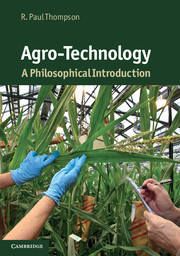Book contents
- Frontmatter
- Contents
- List of figures
- List of tables
- Preface
- Introduction
- 1 Scientific background
- 2 Application of genetics to agriculture
- 3 Philosophical and conceptual background
- 4 The controversy
- 5 The controversy
- 6 The controversy
- 7 The organic alternative
- 8 Impacts on low- and middle-income countries
- Concluding remarks
- Bibliography
- Index
3 - Philosophical and conceptual background
Published online by Cambridge University Press: 05 June 2012
- Frontmatter
- Contents
- List of figures
- List of tables
- Preface
- Introduction
- 1 Scientific background
- 2 Application of genetics to agriculture
- 3 Philosophical and conceptual background
- 4 The controversy
- 5 The controversy
- 6 The controversy
- 7 The organic alternative
- 8 Impacts on low- and middle-income countries
- Concluding remarks
- Bibliography
- Index
Summary
Consider the claim, ‘Inserting a gene into a plant that causes it to produce a compound that is toxic to the larval stage of many insects is harmful and should be prohibited.’ This, on the surface, seems to be a straightforward claim, but below the surface lurk numerous logical inferences, presuppositions and evidential claims. The evidential claims on which it rests are the most obvious of these. Its acceptability depends on there being evidence that genes result in certain traits, that a specific compound is toxic to the larval stage of specific insects, and that this leads to consequences, such as the safety of food, the mortality and morbidity of people, and/or the integrity of ecosystems and the environment.
It also rests on an assumption that these consequences are negative (harmful). This might be taken to be another empirical (scientific) assumption. In part it is, but it goes well beyond empirical evidence and imports values. A change in an ecosystem, for example, is not in and of itself negative or harmful. Were ecosystems not constantly in flux – a constant flux that was occurring for more than a billion years before the emergence of hominids – the evolution of the rich biodiversity of life today would never have occurred, and hominids would not have emerged. Deeming consequences negative is inextricably connected to human goals, desires and ideas. In most value (ethical) systems, unsafe food, increases in human mortality and morbidity, and a decrease in biodiversity or the stability of ecosystems due to a human activity are harms because of their effect on humans. But even in those few systems where advocates maintain that humans have a moral obligation that transcends their own welfare to minimise the impact of human activity on nature, a value is being appealed to – perhaps given by a deity in a command to be a faithful steward of the Earth or some such external source.
- Type
- Chapter
- Information
- Agro-TechnologyA Philosophical Introduction, pp. 33 - 100Publisher: Cambridge University PressPrint publication year: 2011



